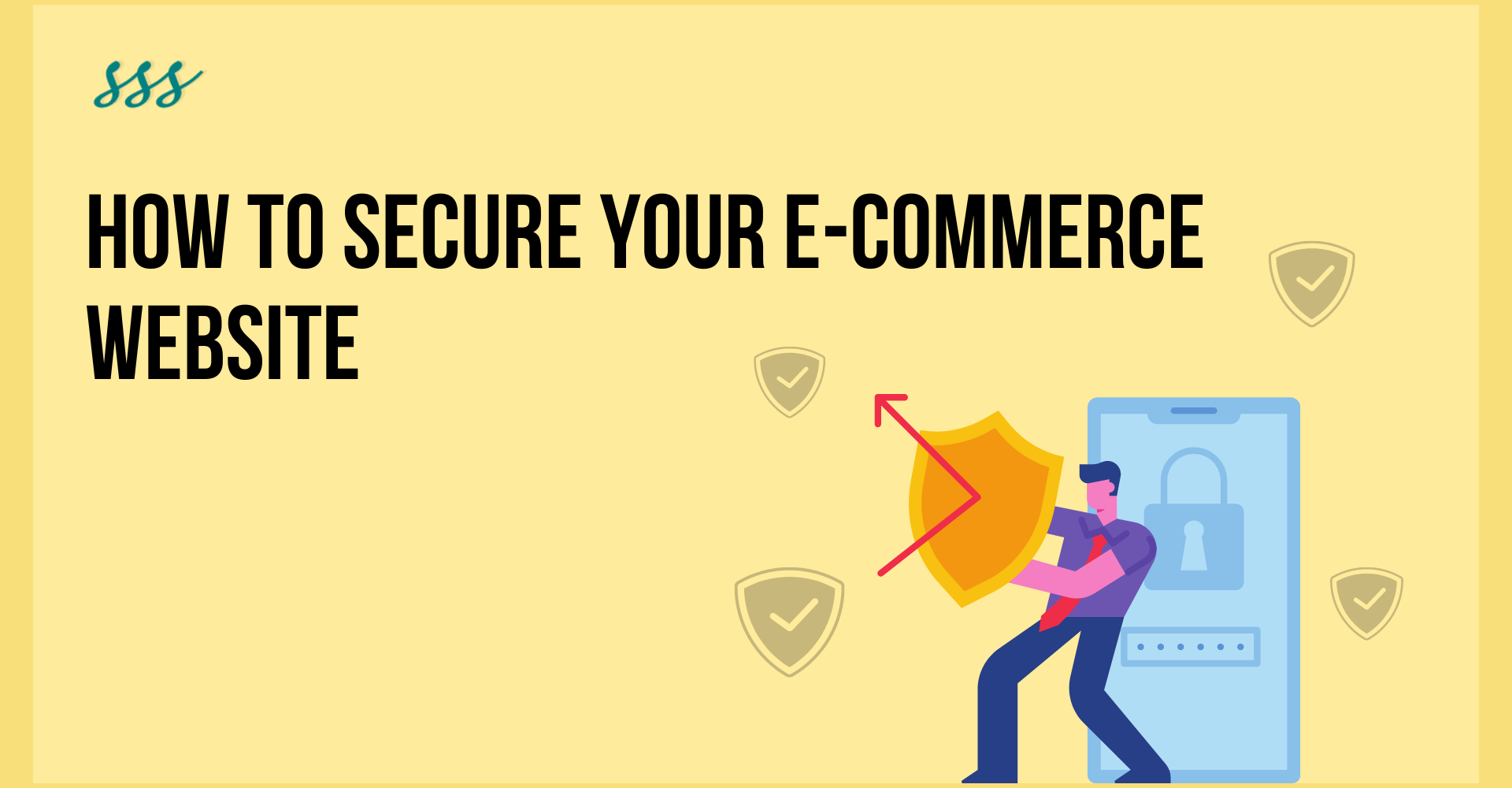
Best Practices for Securing Your E-commerce Website
In an era where convenience and accessibility define the modern marketplace, e-commerce has emerged as a pivotal driver of global trade. The digital realm has seamlessly woven itself into the fabric of commerce, enabling businesses to reach consumers far and wide.
However, this surge in online transactions has also given rise to a pressing concern – the vulnerability of sensitive data in the vast expanse of the digital landscape. As the e-commerce ecosystem continues to thrive, the imperative for robust security measures becomes paramount.
The exponential growth of e-commerce brings with it an array of cyber threats that loom over both businesses and consumers. From sophisticated hacking techniques to ransomware attacks, the digital domain has become a battleground for nefarious actors seeking to exploit vulnerabilities in the e-commerce infrastructure.
As consumers entrust their personal and financial information to online platforms, the need for stringent security measures has never been more urgent.
This article delves into the multifaceted landscape of e-commerce security, dissecting the key components that safeguard the integrity of online transactions. It explores the evolving nature of cyber threats and the innovative strategies adopted by businesses to counteract these challenges. From encryption protocols to secure payment gateways, the article navigates through the technological armory that fortifies e-commerce platforms against potential breaches.
Why is E-commerce Website Security Crucial?
E-commerce website security has ascended to the forefront of business priorities, and with good reason. As the digital marketplace continues its unprecedented growth, the exchange of sensitive information, such as personal details and financial data, has become intrinsic to online transactions. Consequently, the imperative to safeguard this information from malicious actors has elevated e-commerce website security to a top-tier concern for businesses and consumers alike.
One of the foremost reasons for prioritizing e-commerce website security lies in the escalating sophistication of cyber threats. Malicious entities continually refine their tactics, employing advanced techniques such as phishing, ransomware, and data breaches. These threats pose a significant risk not only to the financial well-being of businesses but also to the trust and confidence of consumers. A breach not only jeopardizes sensitive information but can also lead to reputational damage that is challenging to repair.
Moreover, e-commerce platforms are a prime target for hackers due to the vast amounts of valuable data they store. Customer profiles, credit card information, and transaction histories are enticing targets for cybercriminals seeking to exploit vulnerabilities in the digital infrastructure. Consequently, investing in robust e-commerce website security measures is not merely a precautionary step but an essential proactive defense against potential breaches.
The financial ramifications of a security breach are substantial, encompassing not only the direct costs of mitigating the incident but also potential legal liabilities and regulatory fines. Beyond financial consequences, a compromised e-commerce website can result in a loss of customer trust, which is invaluable in the competitive digital landscape. Consumers are increasingly discerning and selective about where they conduct online transactions, gravitating toward platforms that prioritize and demonstrate a commitment to robust security.
In essence, e-commerce website security is a top priority because it safeguards not only sensitive data but also the very foundation of trust upon which successful online transactions are built. Businesses that prioritize and invest in comprehensive security measures signal to their customers that their safety is paramount, fostering a secure and reliable environment for the flourishing digital marketplace.
5 Major Ecommerce Cyber Security Threats
As the e-commerce landscape continues to evolve, the prevalence of cyber threats targeting online businesses has risen exponentially. Recognizing and understanding these threats is crucial for businesses to implement effective cybersecurity measures. Here are the top five major e-commerce cyber security threats:
1. Payment Card Fraud:
Payment card fraud remains a persistent threat to e-commerce platforms. Cybercriminals often employ various techniques, including card skimming and phishing attacks, to compromise payment card information during online transactions. Once obtained, this sensitive data can be sold on the dark web or used for unauthorized purchases, causing financial losses for both businesses and consumers. Implementing secure payment gateways, encryption protocols, and regularly monitoring transactions for anomalies are essential measures to combat payment card fraud.
2. Phishing Attacks:
Phishing attacks are a prevalent and evolving threat in the e-commerce sector. Cybercriminals use deceptive emails, messages, or websites to trick users into revealing sensitive information such as login credentials or financial details. E-commerce platforms are particularly vulnerable as they deal with vast amounts of customer data. Educating users about recognizing phishing attempts, implementing email authentication measures, and deploying anti-phishing tools can help mitigate the risks associated with phishing attacks.
3. Distributed Denial of Service (DDoS) Attacks:
DDoS attacks pose a significant threat to the availability and performance of e-commerce websites. Cybercriminals overwhelm the targeted site’s servers with a flood of traffic, rendering it inaccessible to legitimate users. E-commerce platforms, reliant on continuous availability, can suffer severe financial losses and damage to their reputation during a DDoS attack. Utilizing content delivery networks (CDNs), implementing DDoS mitigation solutions, and having contingency plans in place to quickly restore services are essential safeguards against DDoS threats.
4. SQL Injections:
SQL injections involve injecting malicious SQL code into input fields of an application to manipulate the underlying database. In an e-commerce context, attackers may exploit vulnerabilities in search bars, login forms, or product filters to gain unauthorized access to the database. Once inside, they can extract sensitive information, modify data, or execute unauthorized transactions. Implementing parameterized queries and input validation mechanisms can mitigate the risk of SQL injections.
5. Malware Infections:
Malware infections in the e-commerce realm can take various forms, including the injection of malicious code into the website or the distribution of malware through compromised product listings or advertisements. Malware can be designed to steal sensitive customer information, compromise payment details, or facilitate other malicious activities. Regular security audits, employing web application firewalls, and keeping software and plugins up-to-date are critical steps in preventing and detecting malware infections on e-commerce platforms.
E-commerce Website Security Best Practices
In the ever-expanding landscape of online commerce, where digital transactions reign supreme, safeguarding sensitive data has become paramount. E-commerce website security is not merely a necessity but a pledge to uphold the trust placed by consumers in the virtual marketplace. To fortify your e-commerce fortress, adopting a comprehensive set of best practices is imperative. Let’s explore the key measures that businesses should consider to ensure the integrity, confidentiality, and availability of their e-commerce platforms.
1. Select a Secure Web Host and E-commerce Platform:
The foundation of robust e-commerce security begins with selecting a secure web host and a reliable e-commerce platform. Opt for hosting providers that prioritize security, offering features such as regular security audits, firewalls, and intrusion detection systems. Similarly, choose an e-commerce platform known for its commitment to security, with a track record of promptly addressing vulnerabilities and providing regular updates.
2. Acquire an SSL Certificate:
Secure Sockets Layer (SSL) certificates play a pivotal role in encrypting data transmitted between the user’s browser and the e-commerce server. This encryption is crucial, especially during sensitive operations like payment transactions. Users look for the padlock symbol in the address bar, indicating a secure connection. Acquiring and implementing an SSL certificate not only secures data but also instills confidence in customers regarding the safety of their interactions with the e-commerce site.
3. Conduct Regular SQL Checks:
SQL injections are among the most common cyber threats to e-commerce websites. Regularly check for SQL vulnerabilities by employing security tools and conducting penetration testing. Utilize parameterized queries, input validation, and prepared statements to minimize the risk of SQL injection attacks. By staying vigilant and proactive, businesses can thwart potential exploits and maintain the integrity of their databases.
4. Entrust Payment and Data Processing to Experts:
Entrusting payment and data processing to specialized third-party payment processors adds an extra layer of security. Reputable payment gateways employ advanced security measures, including tokenization and encryption, to protect sensitive information. This not only safeguards customer data but also offloads the burden of managing complex payment processes, allowing businesses to focus on their core competencies.
5. Keep Your Website Updated and Patched:
Outdated software and plugins are prime targets for cybercriminals seeking vulnerabilities. Regularly update the e-commerce platform, content management system (CMS), plugins, and any additional software used. Security patches issued by developers often address known vulnerabilities, and staying current with updates is an effective way to fortify your website against potential exploits.
6. Monitor What You Download and Integrate:
Vigilance extends beyond the e-commerce platform itself; it includes the plugins, themes, and third-party integrations. Only download and integrate components from reputable sources. Be cautious of free plugins or themes from unverified providers, as they may introduce vulnerabilities. Regularly monitor and assess the security practices of integrated services to ensure they align with your e-commerce security standards.
7. Regularly Back Up Your Website Data:
In the event of a security breach, having up-to-date backups is crucial for swift recovery. Regularly back up your e-commerce website data, including databases, configurations, and media files. Store backups in secure, offsite locations to prevent data loss in the event of server failures, cyberattacks, or other unforeseen circumstances.
8. Implement and Utilize a Website Application Firewall (WAF):
A Website Application Firewall acts as a barrier between your website and potential threats, filtering out malicious traffic and protecting against various cyberattacks, including SQL injections and Cross-Site Scripting (XSS). Implementing a WAF adds an additional layer of defense, providing real-time threat detection and mitigation to safeguard your e-commerce platform.
Conclusion
In the dynamic world of e-commerce, security is the bedrock upon which trust and success are built. Implementing robust e-commerce solutions, from secure hosting to SSL encryption, is not merely a choice but a necessity. By embracing these practices, businesses not only fortify their digital fortresses against cyber threats but also cultivate an environment where customers feel confident in their online interactions. Experts, keeping the website updated, monitoring integrations, regularly backing up data, and implementing a Website Application Firewall, businesses can create a digital fortress that not only withstands cyber threats but also fosters trust in the dynamic landscape of e-commerce. We hope this article helps you to understand it better.


